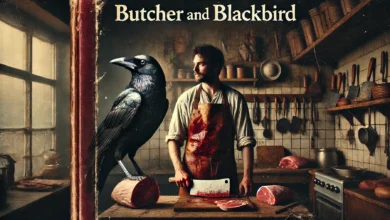Book Review: Remarkably Bright Creatures by Shelby Van Pelt

Introduction
Have you ever felt an unexpected connection with someone—or something—that you least expected? Shelby Van Pelt’s Remarkably Bright Creatures delves into this idea, inviting readers into a world where humans and sea creatures intertwine in an unlikely yet deeply moving narrative.
In a world where loneliness often prevails, many people search for connection, but sometimes, it’s the most unexpected relationships that make the biggest difference. The novel explores the struggles of those seeking meaning in their lives and how the most unusual bonds can offer the healing and companionship we need.
In this review, We’ll explore how Van Pelt uses these themes to craft a story that is both heartwarming and thought-provoking, filled with unforgettable characters and moments that will stay with you long after you’ve turned the final page.
Plot Summary
Remarkably Bright Creatures tells the story of Tova Sullivan, a 70-year-old widow who works the night shift at a local aquarium. Her life is a quiet routine, shaped by her grief over her son’s mysterious disappearance many years ago. One of the highlights of the aquarium is Marcellus, an octopus with an extraordinary intelligence and a penchant for observing the human world around him. As Tova and Marcellus form an unlikely friendship, the book explores themes of loss, healing, and the unlikely connections that transform our lives.
The plot weaves together the lives of various characters, each navigating their personal struggles while finding unexpected connections in places they never imagined. The narrative is rich in emotion and filled with moments of humor, tenderness, and surprising revelations.
Character Development
At the heart of Remarkably Bright Creatures is Tova, a character whose grief and isolation resonate with anyone who has experienced loss. Her quiet, solitary life is disrupted by her bond with Marcellus, an octopus whose intelligence and wit provide a humorous yet poignant counterpoint to her own sense of abandonment.
Marcellus, the octopus, is much more than a side character. He is an astute observer of human behavior, and through his eyes, we learn not only about the people around him but also about his own journey and the secrets he’s been keeping. Marcellus’s ability to communicate his thoughts to the readers adds depth and charm to his character, making him one of the most memorable characters in recent fiction.
Secondary characters, such as the young, troubled Cameron, add complexity to the narrative. Cameron’s storyline, intertwined with Tova’s, speaks to the power of second chances and the importance of finding one’s place in the world.
Themes and Messages
One of the most prominent themes of the book is loneliness and the search for connection. Tova’s grief over her son’s disappearance creates a sense of isolation that is only broken when she forms an unlikely friendship with Marcellus. Through their interactions, the book emphasizes that connection doesn’t always come in expected forms, and that healing can arise from the most unexpected places.
The novel also explores themes of forgiveness, both self-forgiveness and forgiving others. Tova’s journey is as much about coming to terms with her past as it is about learning to embrace new relationships. The narrative reminds us that while we cannot change the past, we can find new ways to move forward and create new meanings in our lives.
Writing Style
Shelby Van Pelt’s writing is engaging, clear, and deeply evocative. She masterfully captures the complexities of grief and healing, blending humor and pathos seamlessly. Her use of alternating perspectives—particularly Marcellus’s—adds a unique layer to the narrative, offering fresh insights into the human condition through the eyes of an octopus.
The pacing of the novel is steady, allowing the reader to fully immerse themselves in the world of the aquarium and the characters’ inner struggles. Van Pelt’s writing style complements the quiet, contemplative nature of the story while still maintaining an engaging rhythm.
Emotional Impact
Remarkably Bright Creatures has a profound emotional impact. From the poignant moments of Tova’s grief to the surprising humor that comes from Marcellus’s observations, the novel captures a wide range of emotions. There are moments of heartache, particularly as Tova confronts her past, but also moments of warmth and joy as she begins to open up to others.
The relationship between Tova and Marcellus is especially touching, showcasing how even the most unconventional connections can help us heal. The book’s ending is satisfying and emotionally resonant, offering hope and a sense of closure without feeling overly sentimental.
Comparisons
Remarkably Bright Creatures can be compared to other novels that explore themes of connection and healing, such as The Curious Incident of the Dog in the Night-Time by Mark Haddon and A Man Called Ove by Fredrik Backman. Like these novels, Van Pelt’s work is deeply character-driven, with an emphasis on the emotional growth of the protagonist and the power of unlikely friendships.
What sets Remarkably Bright Creatures apart is its inclusion of Marcellus, the octopus. His unique perspective adds a refreshing and unexpected layer to the story, making it stand out in the genre of contemporary fiction.
Final Thoughts
Remarkably Bright Creatures is a beautifully written, emotionally resonant story about connection, healing, and the surprising places where we find both. Van Pelt’s rich characterization, evocative writing, and exploration of universal themes make this book a truly remarkable read. If you’re looking for a story that will touch your heart and leave you thinking long after the last page, this is the book for you.
Conclusion
In conclusion, Remarkably Bright Creatures is a deeply moving novel that explores the complexities of loneliness, grief, and connection. Whether you’re a fan of character-driven stories or simply looking for something with a touch of heart and humor, Shelby Van Pelt’s novel is a must-read. Let me know your thoughts if you’ve read the book—how did it resonate with you? Share your comments below!




